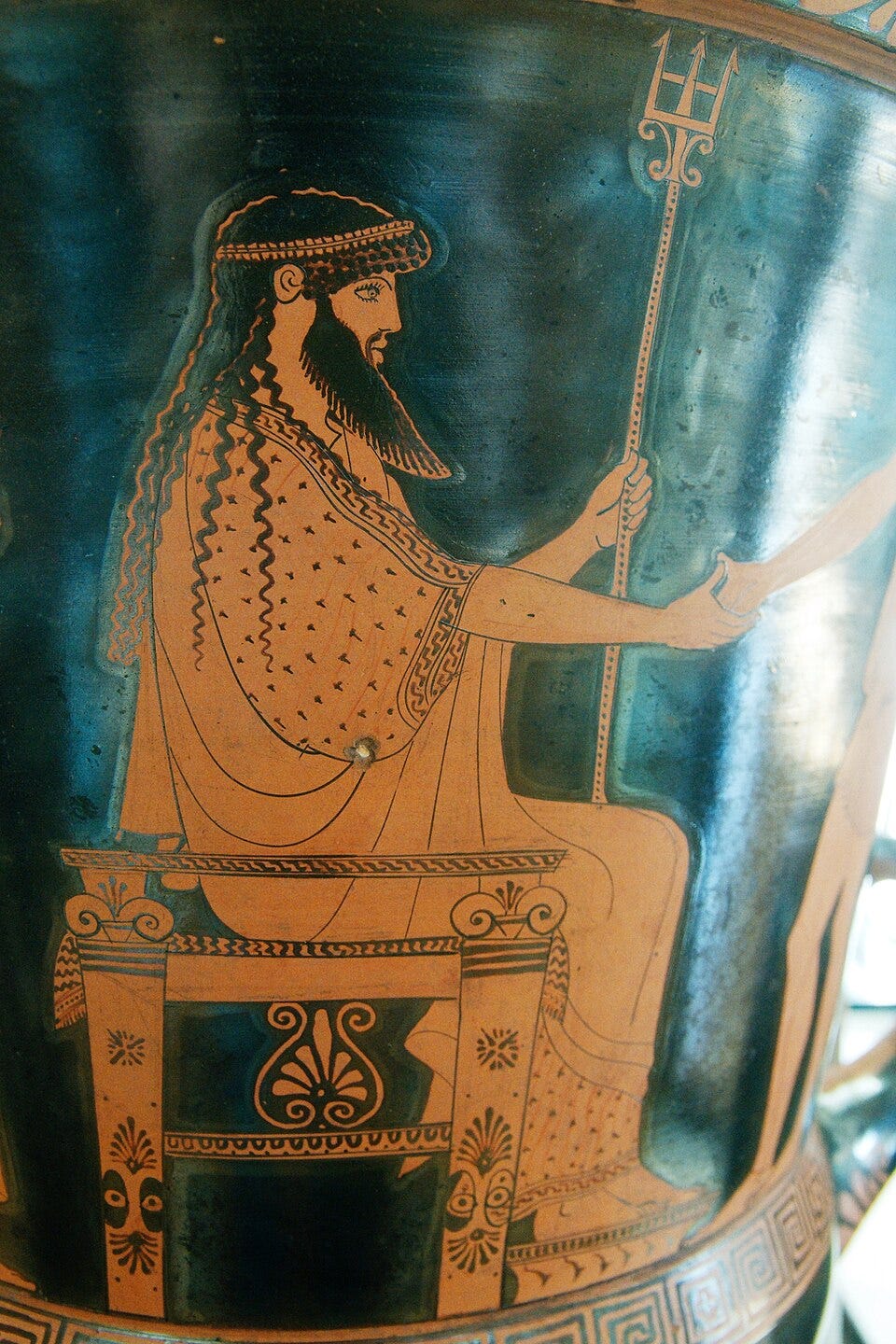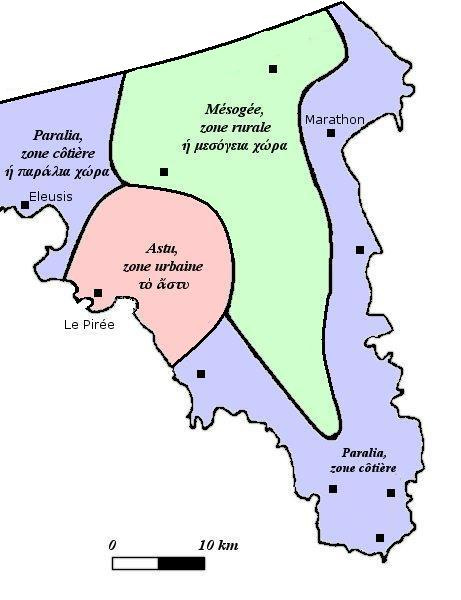A Greek Ramble
Putting Ancient Greece in Context: Podcast notes and quotes. Plus Picnic pics~!
Welcome Readers, old and new~! Thanks for subscribing, I’m so glad you’re here!
We take off for Europe in a few days, bound for Greece, then England. Packing is underway and it seems there are a million and one things to do, leaving too little time to write!
We had a Glorious Fourth with the Brilliant Wife’s clan. The perfect fire-cracker-hot day witnessed corn hole and euchre tournaments, delicious food, swimming and folks just sitting in the shade catching up. Not sure exactly how many came but we weren’t far from forty, counting all the little ones, of course. I’ll put a few pictures up below.
I’ve been listening to podcasts and books about the history of Greece and its philosophers. Their influence was surprisingly far-flung. Many of our ideas and words come from the ancient Greeks.
One thing that has surprised me is how closely Christian theology uses Greek ideas. For example, Sophia, also known as Athena, was the Greek goddess of knowledge. The same feminine divine has had many names in many cultures: Isis in Egypt, Ishtar in Babylon, Inanna in Sumeria.
Hagia Sophia, Istanbul. CC
One of the oldest churches in the world is the Haga Sophia (“Holy Wisdom”) in Istanbul, built by the Roman Constantine the Great in 360 CE, then rebuilt 532-537 by the Byzantine Emperor Justinian I.
Have you ever been inside? It’s an incredible place, though lately it’s been converted back to a mosque, raising controversy.
Eight of its magnificent interior columns are from the Greek Temple of Artemis at Ephesus, which was destroyed in 356 BCE by an arsonist. The Temple of Artemis is mentioned in the Christian Bible!
27 So that not only this our craft is in danger to be set at nought; but also that the temple of the great goddess Diana should be despised, and her magnificence should be destroyed, whom all Asia and the world worshippeth.
28 And when they heard these sayings, they were full of wrath, and cried out, saying, Great is Diana of the Ephesians. Acts 19: 27-28. King James Version
The temple of Artemis was considered one of seven wonders of the ancient world, dating to the Bronze Age. It was also mentioned by the Greek poet and scholar at the Library of Alexandria, Egypt, Callimachus, in his Hymn to Artemis. Artemis was the goddess of the hunt. Isn’t it interesting that the columns from a temple dedicated to a female Greek goddess of hunting ended up in a Christian church named for a female Greek goddess of knowledge?
Eight red porphyry (porfido rosso antico) in the Hagia Sophia were quarried by slaves at Gebel Dokhan in the Eastern Desert of Egypt. They were either reused from another building or came from existing stock, as the quarry shut down in the 5th century C.E. see, The Columns and Capitals of Hagia Sophia.
What does this all have to do with our trip to Greece? The world of the Greeks was widespread and lies at the root of many things, including Christian Orthodoxy.
The Great Schism. 1054 C.E. CC
In 1054 Christianity was split in half between the Roman and Greek worlds, West and East. Notice that southern Italy and Sicily remained in the Eastern Orthodox world. The blue areas remained Greek! Sicily had been colonized by the Greeks well before Rome was founded, in the 8th century BCE. See, Ancient Greek Theaters in Sicily.
Every Greek city had its own theater, illustrating the importance of theatrical plays in Greek culture. The Greek theater in Taormina, Sicily is really amazing, and there are many more.
Our first stop after landing will be at the Temple of Poseidon, located on Cape Sunion, at the southern most point of the Attica Peninsula on which Athens is located, built around 700 BCE. The picture above dates from 1887 (public domain).
Attic vase 400 BCE showing Poseidon enthroned
Poseidon was one of the most important gods of the Athenian Greeks. It’s important to understand that the Greek gods were not like our current understanding of God in the Christian, Jewish, or even Muslim context. They were more like people.
The Greek gods were part of the everyday culture. The gods were like us, interfering in human affairs from time to time (for example in Homer). To make sure things went well it was necessary to make a ritual sacrifice to the gods. If things didn’t go well, it wasn’t the god’s fault. It was your fault for not performing the rituals properly.
Our political structures originated with the Greeks.
The polis, or city, was the fundamental unit of Greek society. The Temple to Poseidon was located in a subdivision of Athens called a deme. Demes originally existed in rural areas, undefended by the walls of the Athens. Demes were part of the Polis (city), and became particularly important after the reforms of Cleisthenes in 504 BCE. A member of the deme could vote and was a citizen.
Before the 504 BCE reforms, citizenship was premised on membership in a family clan, called a Phatry, (Patria). The reforms based citizenship on enrollment in a Deme, instead of membership in a family. This reduced the power of the family patriarchs and weakened the aristocratic Genes who had dominated the Phatries.
Above: The division of the Athenian city-state (polis) into urban (pink), inland (green), and coastal (blue) zones by Cleisthenes. Public domain.
The Demes were like boroughs or neighborhoods, each with their own Dematcho, or mayor. Each deme had its own civil, military, and cult functionaries as well.
Athens had 139 demes after the reforms. The demes were combined into thirty Trillyes, and the Trillyes were combined to form ten Phyla, or tribes. Each tribe contained three Tryttys, one from each of the three regions of Athens: The City, the Coast, and the Inlands, shown above.
Each Phyla or tribe was named after a legendary hero. It was an ingenious way to integrate the city and its suburbs. Of course only certain males could vote and hold office. To qualify, you had to be a man of a certain age, and owned property or be a professional. Women, slaves, foreigners, or common folk need not apply.
Still, it was an important step and the beginning of Democracy. The word Deme came from demos = the people; Kratia means power. So democracy means, literally, People Power. Power to the People. It was quite a change, and not taken to kindly by the hereditary families who had dominated Athens for hundreds of years.
Athens was the main leader of the Delian League, which had established its treasury on the island of Delos, which we’ll be visiting. Under the Athenian leadership of Pericles, the treasury was moved from Delos to Athens, and housed on the Acropolis.
Pericles presided over the Golden Age of Athens, during which the Parthenon was constructed on the Acropolis to house the Delian Treasure.
Pericles died from plague two years after the beginning of the Peloponnesian War. By the time of Socrates democratic Athens had fallen to communist Sparta.
The Delian League, dominated by Athens and shown in brown on the map above, was defeated by the Peloponnesian League in this war.
Pericles had warned the Athenians to stay close to home and avoid open battle with the Spartans, whose soldier hoplites were better trained and more numerous, relying instead on their navy. But a plague hit the city in 430 BCE, killing Pericles, his sons, and 30,000 soldiers, sailors and citizens.
Eventually the Athenians sent their fleet to Sicily to assist allies who were threatened by Syracuse. Alcibiades, a student and lover of Socrates, was one of the leaders. The Spartans came to the aid of Syracuse and defeated the Athenians, and Alcibiades defected to the Spartan side.
This was the beginning of the end for Athens. It eventually fell to the Spartans. Its walls were destroyed and it was limited to only ten merchant ships, rather than its fleet of a hundred war ships.
This was the backdrop for the trial of Socrates, which lead to his death. His relationship with Alcibiades proved fatal.
So by the time of Plato, who was a student of Socrates, and Aristotle (a student of Plato), Athens was under the thumb of Sparta, a communist city-state that, with the assistance of the Persians, was able to destroy the Athenians.
Yet Spartan’s dominance would be short-lived. Soon Philip II would descend from Macedonia and his son Alexander would begin his conquest of the world, including Egypt and India.
The legacy of the Greeks is much more than its art, sculpture and architecture, of course. Its advances in logic, science and philosophy are even more important in my opinion. Here are a few pithy quotes I thought you might enjoy, most from Aristotle:
Live a life of Reason.
Follow the middle way, the Golden Mean.
Excellence is a habit.
Nothing in excess.
Happiness is multiplied by being shared.
Our philosophy is where our treasure lies.
Communism fails because it provides no stimulus for improvement.
The fruition of art is catharsis through unification.
We watched Zorba the Greek last night, probably for the third time. The 1964 film, starring Anthony Quinn, reminds us that no matter how bad things go, we still need to dance~! It’s the hidden language of the soul.
Here are a few picnic pics.






Thanks so much for subscribing, liking, and sharing. Love to hear your comments~!
Stand by for BLAST OFF~!













Thanks, as always, for sharing. Is that a rhubarb pie I spy? You missed my rhubarb cookies on Tues.
Very interesting, especially the association of Sparta with communism. That's the first time I've ever seen it used for societies before the 19th Century. What form did it take in Sparta? Was is different that the Soviet version. The only socialist model I've experienced was the kibbutz. I dare say the kibbutz model defies the quote about communism inhibiting improvement. If anything, the kibbutz allowed individuals the time to pursue person interests such as art, athletics. And as a group, they worked together to build the infrastructure and thus the success of combined efforts toward agreed upon goals.